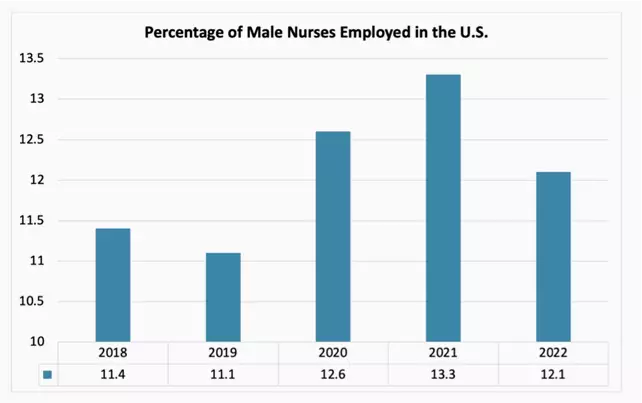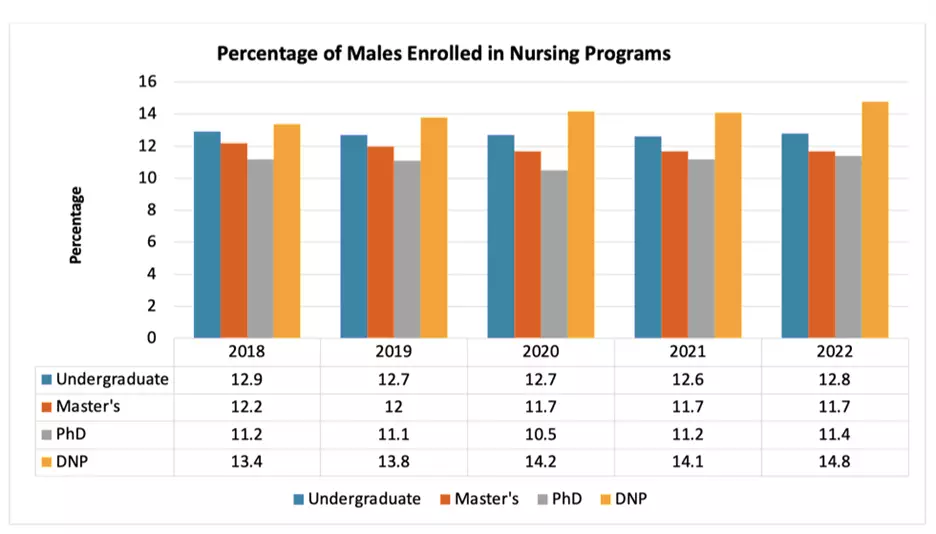Men in nursing: Why men should consider a career in nursing
This article has been vetted by University of Phoenix's editorial advisory committee.
Read more about our editorial process.

This article was reviewed by Raelene Brooks, Dean, College of Nursing.
This article was updated on April 16, 2024.
When Thomas Falletta, DNP, RN, ANP-BC, was awaiting the birth of his daughter, he had an epiphany. It wasn’t about his growing family, though. It was about his career.
As he watched nurses and doctors move purposefully through the hospital, the high school teacher felt that he should be doing something different with his life. “It was kind of like a you-missed-your-calling type of thing,” Falletta recalls.
Falletta’s mother was a nurse, which is why that was the one profession he’d always disavowed. He knew firsthand what a tough job it was.
But after his daughter’s birth, it suddenly became intriguing. He recognized how much more flexibility nursing offered regarding both career pathways and his day-to-day schedule than, say, being a doctor did. His instincts were validated once he enrolled in nursing school. “I realized I was indeed in the right place,” he says.
Today, Falletta works as a clinical coordinator for the Master of Science in Nursing/Family Nurse Practitioner (FNP) program at University of Phoenix. While he is not alone in his calling, his is an admittedly exclusive group: Just 13% of registered nurses were men in 2023, according to the U.S. Bureau of Labor Statistics (BLS). That number, however, has climbed over the decades. The U.S. Census Bureau reports that approximately just 2.7% of RNs were men in 1970.
So, what are the benefits of being a male nurse, what are nurse salaries and why do we need more male nurses in healthcare in general? Here, we explore the history and future of men in nursing.
Ready for the challenge? Maybe it's time to pursue an RN to BSN degree.
History of men in nursing
As noted by the U.S. Census Bureau, “Men had significant representation in nursing until the 1800s because of the early association between nursing, the military and religious orders.”
With the outbreak of the Civil War, however, women stepped in to “fill the gap.” This shifted labor demographics away from nursing professions as a mostly male-dominated industry; by the early 1900s, women essentially dominated the nursing profession. In fact, men were not allowed to serve as nurses in certain groups like the Army Nurse Corps until after the Korean War.
Male nurse statistics
Men in the nursing field followed this pattern, with numbers declining until the 1970s when recruiting and occupational retraining efforts were redoubled to avoid a predicted labor shortage in nursing jobs.
According to the American Association of Colleges of Nursing, the United States did see an increase of employed male nurses from 2019 to 2021, but there was a slight decrease in that number in 2022. See Figure 1.

Figure 1: Percentage of Male Nurses Employed in the U.S.
Figure 2 shows the percentage of men in nursing programs from undergraduate to master’s degrees, PhDs and DNPs.

Both figures ultimately show that male nurses have plenty of opportunity to join the field, as enrollment numbers have remained steady over the past five years. There are also opportunities within various levels of nursing degrees and among different types of nurses. For men who have an interest in healthcare, nursing offers plenty of educational and career pathways.
What is it like to be a male nurse?
For Randall Hamilton, DNP, FNP-BC, the interest in nursing among men is not surprising. Hamilton is the former academic director of UOPX’s Doctor of Nursing Practice (DNP) program, and he’s been in the field since he started out as a nursing assistant in 1977. (Today, he serves as an associate faculty member in UOPX’s College of Nursing.) The impact nurses had on people’s lives resonated with Hamilton, and so did another interesting aspect of nursing.
“I recall [seeing], even at that early age of 19 or 20, the respect [nurses] had from patients and physicians, and I remember that being a goal early on when thinking about my career path.”
Like Falletta, Hamilton has a lot of familial experience with nursing. His wife, mother-in-law and daughters are nurses.
Unlike Falletta, Hamilton has experienced some of the stigma that comes along with being a male nurse.
“Back then, it was unusual for a male to become a nurse,” Hamilton recalls. “People would ask, ‘Why didn’t you become a doctor? Did you fail at becoming a doctor and then go into nursing?’”
This line of questioning has diminished over the years, Hamilton acknowledges, and overall, his clinical experiences have been positive. Yes, he says male nurses tend to get assignments that require heavy lifting and sometimes even combative patients, but he’s never seen that as a problem. “It was just the strategy, more or less, to care for patients,” he adds.
Beyond strategic differences, Hamilton points out that there are some distinct advantages to being a male nurse too.
6 reasons nursing is a great career for men
1. Steady job market. “I’ve never had the up-and-down job market,” Hamilton says. And that isn’t changing anytime soon. Job growth for registered nurses is projected to continue at a rate of 6% between 2022 and 2032, according to BLS .
2. A variety of career paths. Whether you’re easily bored or a lifelong learner or looking for a career, nursing fits the bill for men as well. “It’s really amazing the variety of roles you can end up exploring,” says Falletta, who has worked as a bedside nurse, charge nurse, nurse practitioner and educator.
3. Flexibility. For men looking to balance other interests or even child care with work, nursing offers a tantalizing level of flexibility. As nurses, Hamilton and his wife were able to schedule their shifts around each other so that one of them could be home when their children were young.
4. Male nurses stand out for all the right reasons. “Because there are so few males, people get to know you a lot better,” Hamilton says. Men in nursing also bring diversity and fresh perspectives to the table. Their unique presence can foster a more inclusive and collaborative work environment, which could enhance patient care and satisfaction.
5. Men make nursing more accessible. Patients sometimes prefer nurses of one gender or another, which means male nurses answer an important desire from the patient population. By increasing the representation of men in nursing, healthcare facilities can better accommodate the diverse preferences of their patients, promoting greater comfort and trust in the care they receive.
6. Nursing is a rewarding field. Male or female, nurses get perhaps one of the biggest payoffs out there: being able to heal other human beings. Whether it’s comforting a distressed patient, assisting in lifesaving procedures or advocating for better healthcare policies, nurses play a vital role in improving the lives of individuals and communities.
read similar articles

A list of essential nursing skills
Misconceptions about male nurses
While nursing offers some compelling advantages for men, it doesn’t come without a few challenges. Chief among these are the misconceptions male nurses still dispel.
Men are often characterized as less empathetic, compassionate and caring individuals. A common myth that men in nursing also encounter is the idea that they couldn’t “hack medical school.” This couldn’t be further from the truth.
“We are not doctor wannabes,” Hamilton says. “Every male nurse I know went into nursing because he wanted to be a nurse.”
Falletta takes this one step further, saying RNs “[are] doing more than [they] ever did” before as they have access to more research opportunities and education.
That said, male nurses must learn how to navigate the complexities of being a man in a healthcare field dominated by women. Hamilton often had to clarify that his female colleague was the doctor and that he was the nurse.
There are also certain protocols that male nurses have to follow with female patients. Routine procedures like checking incisions or bathing female patients often require the presence of a chaperone, Hamilton says. Additionally, female patients may prefer female nurses in the field of obstetrics and gynecology (OB-GYN).
To the latter issue, Falletta offers one possible solution: Male OB-GYN nurses could start their own practice with other like-minded professionals in the industry, which would attract a like-minded patient population.
Nurse salary
Like any salary range, that of nursing is subject to experience, geography, area and type of practice.
But there are other caveats to consider as well, such as career paths and opportunities for advancement. The level of education you obtain can also impact salary.
Registered nurse salary
- Annual salary: Registered nurses had a salary range between $61,250 and $129,400 in May 2022, according to BLS.
- Education requirements: A bachelor’s degree is typically required.
- Job outlook: 6% between 2022 and 2032, according to BLS.
- The salary ranges are reported by the U.S. Bureau of Labor Statistics and are not specific to University of Phoenix graduates. Further, these national averages may include earners at all stages of their career and may not accurately reflect entry-level wages or variations by region. Your earning outcome may vary. University of Phoenix does not guarantee salary level.
Why now is the time to be a male nurse
If the previous 50 years are anything to go by, nursing could continue to attract more and more men in the coming years. And this, pretty much everyone agrees, is a good thing.
Falletta emphasizes the importance of recruiting more men in nursing education. Having strong male figures in education will attract other males to the field, he says.
In the field, having more male nurses creates a mutually beneficial situation. Nursing itself would gain a more equitable balance between genders while men could tap into the flexibility and earning potential nursing affords.
The most in-demand skills for a career in healthcare aren’t necessarily what you think they are either. Technological aptitude, big-picture thinking and empathy are just a few examples of what healthcare careers require these days. And those are all qualities men and women alike bring to the table.
Explore nursing programs at University of Phoenix
Ready to make your next move in nursing? Discover programs at University of Phoenix designed to enhance the career experience of registered nurses!
RN to Bachelor of Science in Nursing: Learn skills to be a better researcher, practitioner and leader within nursing! Traditional online and competency-based options are available.
Master of Science in Nursing degrees: Prepare for nursing leadership with an advanced degree in nursing. Various concentration opportunities exist within this degree program, including in Informatics, Administration and Education.
Master of Science in Nursing/Family Nurse Practitioner: Gain skills for a more hands-on role in nursing. This program can be completed in as little as 26 months and includes a five-day, in-person residency.
Master of Science in Nursing/Psychiatric Mental Health Nurse Practitioner: Learn about psychotherapeutic intervention, pharmacological management and more as you prepare to work as a nurse practitioner in the mental health space.
Nurse bridge program: This track allows registered nurses who hold a bachelor’s degree in an unrelated field to earn their master’s degree more quickly.
Doctor of Nursing Practice: Earn your terminal degree in nursing with this online program that focuses on practical and applicable skills. Students focus on ways to advance nursing practice, improve the healthcare environment and synthesize emerging and established data.

ABOUT THE AUTHOR
Elizabeth Exline has been telling stories ever since she won a writing contest in third grade. She's covered design and architecture, travel, lifestyle content and a host of other topics for national, regional, local and brand publications. Additionally, she's worked in content development for Marriott International and manuscript development for a variety of authors.



